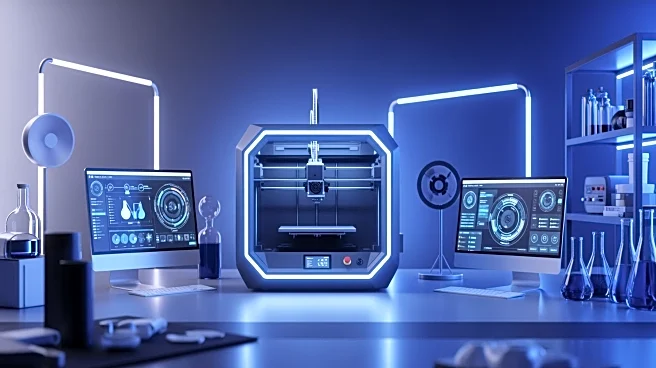What's Happening?
Stratasys has announced a series of innovations aimed at enhancing additive manufacturing productivity. The company introduced new materials, faster print capabilities, and advanced software across its
FDM, SAF, P3 DLP, and software platforms. These updates are designed to help manufacturers reduce production time, improve part quality, and tackle complex applications more efficiently. Notable advancements include the CoatReady print mode for ULTEM 9085 resin, which improves surface quality and reduces manual finishing time, and the Nylon 12CF T40 Tip for Fortus 450mc, which nearly doubles build speed for large, high-strength parts. Additionally, Stratasys has introduced new material options for the Fortus FDC, allowing for larger, stronger parts with reduced moisture-related defects.
Why It's Important?
The innovations by Stratasys are significant for industries such as aerospace, automotive, and consumer products, where efficiency and quality are paramount. By expanding material choices and improving throughput, Stratasys is enabling manufacturers to streamline production processes, potentially reducing costs and increasing competitiveness. The introduction of sustainable, cost-effective solutions like the ABS Fortus PLUS TrueRefill further highlights the company's commitment to operational excellence and environmental responsibility. These advancements could lead to broader adoption of additive manufacturing technologies, transforming product design and supply chain agility.
What's Next?
Stratasys plans to showcase these new solutions at Formnext 2025 in Frankfurt, Germany, from November 18-21. The event will provide an opportunity for industry stakeholders to experience the innovations firsthand and assess their potential impact on manufacturing processes. As manufacturers integrate these technologies, there may be increased demand for Stratasys products, driving further research and development in additive manufacturing. The company's ongoing commitment to innovation suggests that additional advancements may be forthcoming, further solidifying its position as a leader in the field.
Beyond the Headlines
The advancements by Stratasys could have long-term implications for the manufacturing industry, including shifts towards more sustainable practices and increased reliance on additive manufacturing. The introduction of predictive thermal build management and enhanced accuracy modes may lead to improved reliability and consistency in production, setting new benchmarks for quality. As these technologies become more widespread, they could influence industry standards and drive further innovation in material science and manufacturing processes.











